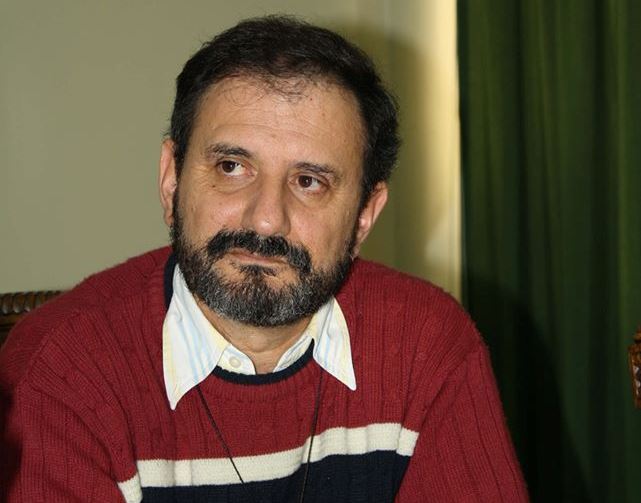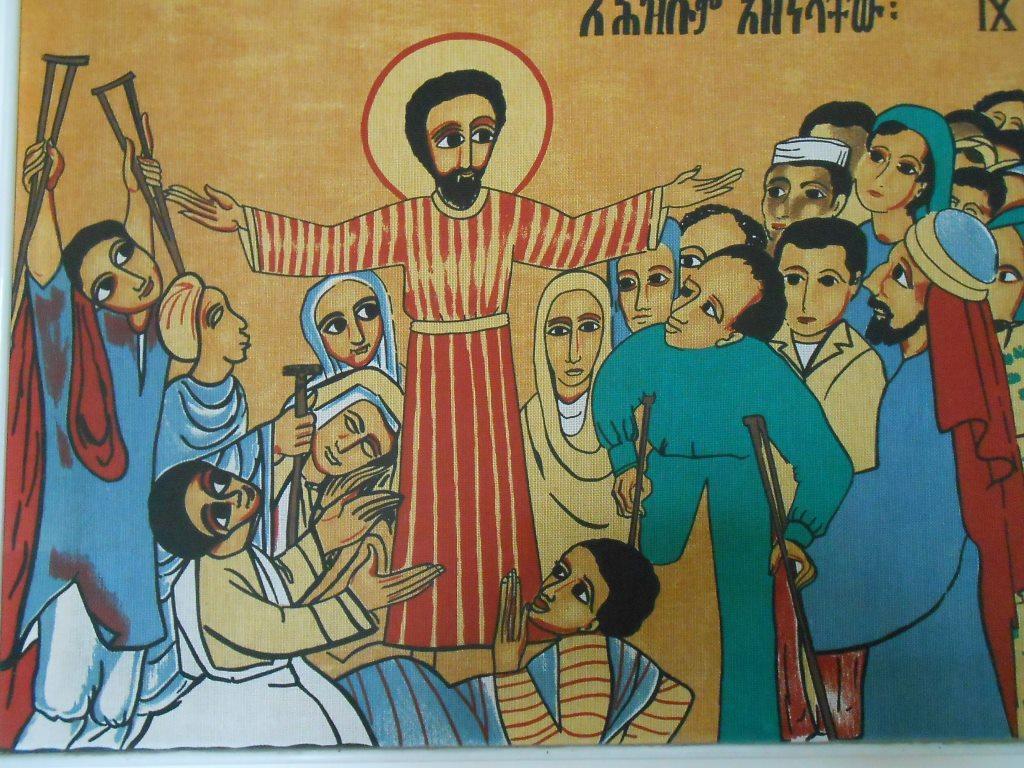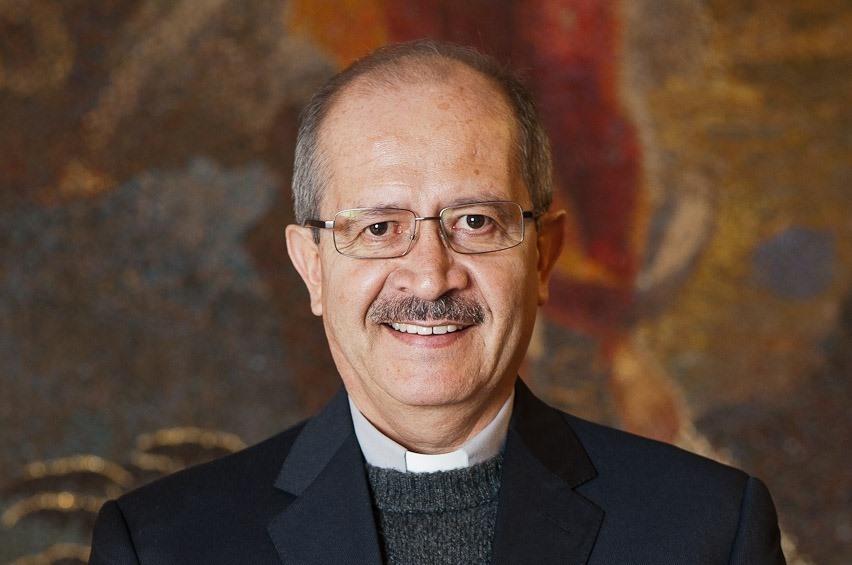Daniel Comboni
Comboni Missionaries
Institutional area
Other links
Newsletter
Thursday, August 22, 2013
“It would be very useful, in this time of celebration, to ask ourselves if our lives give off the odour of sanctity of Comboni. How well our interests are centred upon mission, how much and in what ways we have seen our lives transformed and our missionary commitment improved”, writes Fr. Enrique Sánchez G., Superior General, in his message at the eve of the tenth anniversary of the canonisation (October 5, 2013) of St. Daniel Comboni.
THE HOLINESS OF COMBONI
CHALLENGES OURS
““Our life, a Missionary’s life, is a combination of grief and enjoyment, exhaustion and hope, suffering and consolation. We work with our hands and our heads, we travel on foot and in canoes. We study, we sweat, we suffer, we rejoice. This is all that Providence wants of us.”
(Comboni, Writings 314)
We are almost at the eve of the tenth anniversary of the canonisation of St. Daniel Comboni, our Father and Founder, from whom we have inherited the charism that allows us, in the present moment, to share his life, his vocation and his passion for the poorest and most abandoned.
We have here a date which recalls for us the grace of Comboni’s holiness lived, first of all, by Comboni himself and then by numerous Comboni men and women missionaries, by secular missionaries, and by Comboni lay men and women who have followed his footsteps and today live out the mission as a place where the will of God, that all be holy as he is holy, is realised.
I believe this is a good opportunity for us to pause for a moment and give thanks for the gift of the holiness of Comboni who, during these years, won over many people who find in him a model and inspiration for living the spirituality and beauty of the missionary vocation.
For us, who have made his charism the option of our lives, it is a special moment when we ask ourselves how far his sanctity has transformed our personal journey of holiness and how his holiness has transformed our lives and made of us authentic men and women of God, entirely consecrated to the mission.
It is certainly a moment of gratitude because we are witnesses and may state simply that Comboni continues to be, today, not only a great missionary who inspires and attracts many people involved in mission, but also a journey of experienced holiness that may lead to an encounter with the Lord through personal consecration to the service of the proclamation of the Gospel.
On the other hand, for us who believe ourselves to be the heirs of his charism and the ones who continue his work, this celebration becomes an opportunity we cannot miss to ask ourselves how we have lived the gift of the holiness of Comboni in our missionary service, in our experience of community life, in our life witness and in the wholeheartedness and clarity of our options. Pope Francis reminded us recently that pastors must be impregnated with the scent of the sheep. It would be very useful, in this time of celebration, to ask ourselves if our lives give off the odour of sanctity of Comboni. How well our interests are centred upon mission, how much and in what ways we have seen our lives transformed and our missionary commitment improved.
What are we celebrating on his tenth anniversary?
We wish to celebrate the missionary holiness of a man who was able to open his heart to the plan of God in his life, allowing himself to be transformed into a tireless worker in the building up the Kingdom among those people who became the passion of his life.
We are celebrating holiness expressed through openness to the will of God, shown in the specific call to consecrate his entire life to the mission. “If I abandon the idea of consecrating myself to the foreign Missions, I will be a martyr for the rest of my life to the idea that germinated in my mind at least 14 years ago, and always grew, as I discovered the loftiness of the apostolate.
If I embrace the idea of the Missions, I make two poor parents martyrs … If nothing else in the midst of the universal conflict my thoughts are in, I think it appropriate to plan to go on a retreat, to consult Religion and God; and He, who is just and governs all things, will know how to extricate me from this tangle, arrange all things and console my parents, if he calls me to give my life under the banner of the Cross in Africa; or if he does not call me, he will be able to erect such obstacles as to make it impossible for me to carry out my plans.” (W 6,7,9).
We give thanks for holiness that is availability and faithfulness to a plan that does not correspond to personal needs but agrees to enter into God’s world, making oneself into one of God’s family, learning to read history with the eyes of God, to love it as only God can, with a heart full of mercy and compassion.
We recall the holiness of Comboni which is realised only when the totality of his person is handed over and consecrated to those whom he always considered the sole beneficiaries of his love: “I have returned among you never again to cease being yours and all consecrated for your greater good in eternity. … I make common cause with each one of you, and the happiest day in my life will be the one on which I will be able to give my life for you.” (SS 3158-3159 – Homily in Khartoum).
We recognise the holiness of Comboni as a holiness that projects itself towards and is reflected in the faces of the poorest and most abandoned in whom he finds the presence of God who precedes us and waits for us in those to whom we are sent as missionaries. It is the holiness of the evangeliser who sanctifies through the proclamation and who evangelises and sanctifies himself in the encounter with the people in whom God precedes him and waits for him, to reveal his face to him.
We give thanks today to the sanctity of Comboni who knew, understood and accepted that, as missionaries, we can only reach holiness when we make common cause with the people to whom we are sent, when we do not reject the pain and suffering of those who are not important or who are simply ignored by the parameters of our contemporary society, when, in simplicity and humility, we commit ourselves to building up a humanity that is more just and respectful of the rights of all.
This is the sort of holiness that becomes commitment and pays the price in person by accepting to be there where others refuse to go because one’s life is at risk. It is a holiness that makes us go out of ourselves, as a first missionary experience that implies leaving our safe environment and all that satisfies and pleases us, that makes us risk our life by offering it totally so that others may have that life which only God can give.
This holiness involves the sacrifice of leaving all, even that which one loves and that to which, in some way, we would have a right, without complaining or attracting attention to oneself.
We want to celebrate missionary holiness that is marked by the cross and sacrifice, remembering that the works of God, in the experience of Comboni, are born and grow at the foot of the cross and that the life of the missionary has nothing to do with comfort, prestige or the commodities that today seem to be the purpose of the existence of many in our world, which suffers from protagonism and self-reference.
This holiness reminds us that we are called to be converted into hidden stones in the foundation of the building, far from the temptation to wish to be seen, to occupy the front seats, to be in the spotlight or on the front pages of the newspapers. “I already see and understand that the Cross is such a friend to me that I have for some time chosen it as my eternal and inseparable Bride. So the Cross will be my beloved bride and my wise and prudent teacher, Mary will be my dearest mother and Jesus my all. In their company, Most Eminent Prince, I fear neither the storms of Rome, nor the tempests of Egypt, nor the turmoil of Verona, nor the clouds of Lyons and Paris. Slowly and surely, walking on thorny ground, I will succeed in establishing and giving life to the proposed Work for the regeneration of Africa, which has been abandoned by everybody, and which is the hardest and most challenging work of the Catholic apostolate.” (S. 1710)
In a word, the holiness of Comboni challenges us and provokes us so that we may not allow ourselves to be gripped by the temptations of our time that pretends to offer us an “easy” mission permeated by a middle-class lifestyle, opposed to anything that implies radicalism, sacrifice or the unconditional offering of self.
As we contemplate Comboni, we discover in him one who directed his life towards one passion alone: the mission, and who lived out this passion within a deep relationship with God through the experience of constant prayer in which he experienced the awareness of being in the hands of God, something that gave him confidence always and in all circumstances
We want to celebrate this holiness that is born and grows in the personal, persevering and daily encounter with the Lord who invites us to share his mission, to live his experience as a builder of the Kingdom, to make ours his lifestyle that becomes witness of the presence of the Father in our lives.
Missionary holiness
In St. Daniel Comboni we wish to celebrate a missionary holiness that is characterised by total commitment to announcing the Gospel to all the people of our time and, in a special way, to the poorest and most abandoned, as the first recipients of the Gospel.
We wish to celebrate the sort of holiness that speaks to us of celebration and rejoicing, of hope and confidence, of simplicity and spontaneity, of welcome and love without limits, as the fruits of the Word sown with generosity in the human heart. It is a holiness that reminds us that, as missionaries, we are men and women destined to turn ourselves into witnesses who announce not a dark and gloomy future but the future prepared for us by God. His is a holiness that invites us to read history, at all levels, with the eyes of faith that do not allow us to distance ourselves from, or ignore the issues of our contemporaries. For this reason it is a holiness that is achieved by a sound commitment, a coherent life, a sound spirituality lived out in the small events of life and the great decisions that define our existence for ever.
With St. Daniel Comboni, we wish to live missionary holiness as an experience that involves great openness to a continual conversion that enables us to recognise who is the true protagonist of mission. It is a conversion that opens us to hospitality, to generosity and the joy of sharing what we are, making us brothers, fathers and mothers of the people to whom we are sent.
Sharing in the holiness of Comboni means accepting an itinerary that leads us by ways that are marked by the cross that involves the giving up of everything, sacrifice, loneliness, going against the flow and following a logic which is not of the world. It means entering with humility into God’s logic, which is grace, the giving of self, constant welcome and service without distinction. In a word, it means love that allows itself to be sacrificed on the cross to overcome death that all may have life in Him.
Comboni, the holy one, formulates all this experience, not just through simple words but still more through the silence of his consecration to the mission, when he says: “the works of God are born and grow at the foot of the cross”.
The conclusion is clear: there is no such thing as Comboni missionary holiness except through the path of the cross.
As sons and daughters of St. Daniele Comboni, we know we are called to work with enthusiasm because the Gospel, the Word of Life who became one of us in the person of Jesus, may find room in the hearts of the men and women of our time.
As we live and strive daily to make our own the holiness of Comboni, we wish to continue his evangelising work by consecrating all our energy, our abilities, our entire lives, in the hope of one day making our own the experience which enabled him to say unflinchingly: “Africa or death”, thus experiencing his total abandonment to the will of God in his life.
It is a missionary holiness that obliges us to deny ourselves so that we may allow the Lord to manifest himself through our lives, tuning us into witnesses who announce the coming of the Kingdom more by our lives than by our preaching, discourses or words. It is a holiness that lives in the joy of offering the only thing we possess: our entire lives.
Ten years on
Ten years ago, on the eve of the celebration of the canonisation, the letter of the three Comboni Institutes stressed the meaning of the event of the canonisation and affirmed “This moment has been welcomed in our Comboni Family with joy and hope because it is seen as a message from God that has to be read and interpreted. We have heard the feelings and expectations which are being expressed by members of the Comboni Family who are saying that: This is a good time to ‘listen again’ to Comboni; this is an opportunity to reclaim our roots, to reclaim what is essential and what counts, that is, to be holy and capable… It is a call to personal and community transformation in accordance with the witness of holiness of our Founder. It is an opportunity to better focus the objectives of our mission ad gentes and a time to revitalise missionary animation in the Churches in which we work...” (Daniel Comboni, Witness of holiness and master of mission – Bulletin 220).
As we keep the memorial today of this event, it comes natural to us to ask: what did it bring about in our lives, our communities and in our Institutes? How much have we grown in this holiness which, in some way, is closely connected to us as heirs to the charism of St. Daniel Comboni?
Have these ten years since the canonisation marked our lives significantly? Do we find ourselves today more holy and capable, more men and women of God, consecrated without reserve to the mission?
Have we made of these years, as was our desire, a favourable time to grow in our awareness of belonging to the Comboni charism? Have we made our own the virtues, the missionary zeal and the radical lifestyle that gained the recognition of the holiness of our Founder?
Are our communities true cenacles of spiritual, community and fraternal life where Christ is at the centre of our interests and our options? Do our lives speak to others of that holiness that has nothing to do with various spiritual theories or theological discourses that are allergic to all that obliges us to present ourselves as consecrated persons?
In what way have we used the holiness of Comboni that the Church presented as a model for the entire Church, remembering that the mission, as he lived it, is a sure path to holiness? Could the celebration of the tenth anniversary not be, as indeed we would wish it, an opportunity to finally provide a qualitative leap to our lives, to continue to grow in the experience of holiness that many confreres and sisters have shown us is possible by the witness of their lives?
I am happy and encouraged at the knowledge that, thanks be to God, the holiness of Comboni has gone beyond the boundaries of our Institute and, as we travel the world, each day we meet more and more people who live out the holiness of Comboni, seeing in him a model of the disciple, a great missionary and an extraordinary example of how to discover the Lord along the pathways of mission.
I hope and desire that this tenth anniversary may be for each one of us much more than a passing moment of celebration that dissolves in the routine of our lives, but that it may become a time of grace, opening us up to the gift of holiness we have in our own home.
With my very best wishes.
Happy Anniversary.
Rome, 15 August, 2013
Fr. Enrique Sánchez G. Mccj
Superior General







